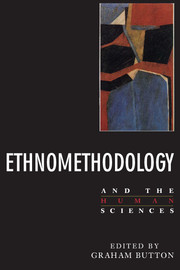Book contents
- Frontmatter
- Contents
- Contributors
- Preface
- 1 Introduction: ethnomethodology and the foundational respecification of the human sciences
- 2 Respecification: evidence for locally produced, naturally accountable phenomena of order, logic, reason, meaning, method, etc. in and as of the essential haecceity of immortal ordinary society (I) – an announcement of studies
- 3 Logic: ethnomethodology and the logic of language
- 4 Epistemology: professional scepticism
- 5 Method: measurement – ordinary and scientific measurement as ethnomethodological phenomena
- 6 Method: evidence and inference – evidence and inference for ethnomethodology
- 7 The social actor: social action in real time
- 8 Cognition: cognition in an ethnomethodological mode
- 9 Language and culture: the linguistic analysis of culture
- 10 Values and moral judgement: communicative praxis as moral order
- References
- Index
9 - Language and culture: the linguistic analysis of culture
Published online by Cambridge University Press: 05 June 2012
- Frontmatter
- Contents
- Contributors
- Preface
- 1 Introduction: ethnomethodology and the foundational respecification of the human sciences
- 2 Respecification: evidence for locally produced, naturally accountable phenomena of order, logic, reason, meaning, method, etc. in and as of the essential haecceity of immortal ordinary society (I) – an announcement of studies
- 3 Logic: ethnomethodology and the logic of language
- 4 Epistemology: professional scepticism
- 5 Method: measurement – ordinary and scientific measurement as ethnomethodological phenomena
- 6 Method: evidence and inference – evidence and inference for ethnomethodology
- 7 The social actor: social action in real time
- 8 Cognition: cognition in an ethnomethodological mode
- 9 Language and culture: the linguistic analysis of culture
- 10 Values and moral judgement: communicative praxis as moral order
- References
- Index
Summary
Introduction
There is a traditional puzzle about the relationship between the linguistic and the socio-cultural. In this chapter I want to suggest that it involves a question about the relationship between linguistics and sociology. Specifically, the question concerns the relationship between their methodological and theoretical frameworks. There is a certain amount of comfortable correspondence between linguistics and sociology which is not surprising given that there are parallels and even direct connections between Durkheim and Saussure, for example. This chapter examines some basic aspects of this complex relationship. A main theme will be the identification of inadequacies in the models constructed by linguists in order to account for the relationship between language and culture. Notable are those inadequacies which accrue from the excessively ‘cognitive’ emphasis of linguistic models. Such cognitive models give, at most, residual status to the social character of language – its social organisation. Indeed, it will be suggested that this cognitive emphasis is a conceptual outgrowth of linguistic treatments which have an in-built philosophical prejudice against the contemplation of action and the social dimension.
The argument will develop two strands. The first will consider the way in which attempts are made to accommodate the social aspects of language within the largely unmodified principles and suppositions of conventional linguistic theorising. Language is conceived in terms of linguistic theory, and the social is accommodated by showing how social variables determine, or are otherwise related to, linguistic ones.
- Type
- Chapter
- Information
- Ethnomethodology and the Human Sciences , pp. 196 - 226Publisher: Cambridge University PressPrint publication year: 1991
- 8
- Cited by



